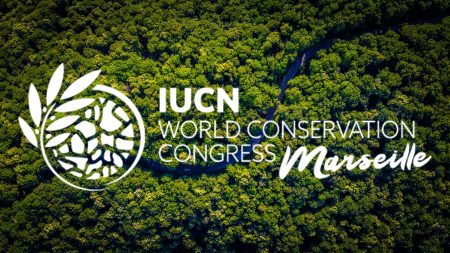IUCN Congress builds momentum on nature-based solutions for biodiversity conservation and climate action

The IUCN World Conservation Congress held 3-11 September 2021 tackled the world’s most pressing environmental challenges, with essential insights addressing the climate and biodiversity crises, as well as focusing on nature-based recovery. The event has three main components: the Members’ Assembly, where IUCN Members vote on priority actions; the Forum, a global marketplace of conservation science and innovation; and the Exhibition, where exhibitors can showcase their work to Congress participants and the public.
“There is no vaccine for a sick planet. The battle for the climate and against the deregulation of the climate is linked inextricably to preserving and restoring biodiversity” – President of France, Emmanuel Macron, at the IUCN Congress opening ceremony in Marseille.
During day one, four Summits were held: the Indigenous Peoples’ Summit, the Global Youth Summit, the CEO Summit and the Local Action Summit, as well as an address by the President of France, Emmanuel Macron. Keynote speakers during the IP Summit stressed the need to incorporate indigenous knowledge to achieve the Sustainable Development Goals, and noted that this inaugural summit constitutes a milestone in recognizing Indigenous Peoples’ contributions to conservation.
On 4 September, day two of the IUCN Congress began with the opening of the Forum, a hub for public debate for four days. A High-Level Dialogue on nature-based recovery explored how economic recovery can be geared towards ‘building back better’ to ensure greater economic and environmental resilience for all by increasing investment in nature. Bruno Oberle, IUCN Director General, called for investments that do not worsen the biodiversity crisis and that earmark at least 10% to benefit nature directly. Rémy Rioux, Chief Executive Officer of the French Development Agency, said training in nature-based solutions can enable financial actors to scale up nature-positive financial resources.
On 5 September, key moments included an interactive session on the post-2020 global biodiversity framework (GBF), providing inputs on different segments of the framework. Suggestions included clarifying the meaning of biodiversity “values,” how these are measured and how to capture non-monetary values; emphasizing sectoral approaches, including a roadmap, clear trajectory and criteria, sectoral regulation, and binding targets. Topics of debate in the Forum included efforts to protect environmental human rights defenders. On the views and role of stakeholders, including Indigenous Peoples, local communities, and civil society, suggestions included more ambitious wording on free, prior, and informed consent; adopting a human rights-based approach; and adding language on inclusion of civic spaces as an enabling condition. A session on the ‘Whole Earth’ approach to global conservation explored transformational change in conservation policy and practice throughout the world such as through convivial conservation.
Day four on 6 September of the Congress explored collaboration for nature, looking at the impact of the One Planet Summit coalition; launched in 2017 by the President of the French Republic, the Secretary General of the UN, and the President of the World Bank Group. Inger Andersen, Executive Director of UNEP, highlighted that “delivering a nature-positive economy requires systemic shifts, first and foremost in our financial systems – it’s not just about improving targets. We need to go straight to the drivers of biodiversity loss”. Discussions were also had on building a nature-positive world, as well as the finding common ground between agriculture and conservation in the High-Level Dialogue on creating productive, sustainable and equitable food systems.
On 7 September, the last day of the Forum was rich in NbS events, including a High-Level Dialogue exploring how to put nature-based solutions at the top of the agenda at upcoming international meetings, while Forum sessions focused on increasing private sector investment in nature. NiaTero‘s Jennifer Corpuz kept the dialogue in reality with two examples from Indigenous Peoples, speaking of worries as well as providing feedback on the IUCN Global Standard for NbS. The need to adhere to the equity guidance within the Global Standard was also highlighted, to ensure that NbS championed by Indigenous Peoples are not co-opted for greenwashing. The IUCNCongress Closing Plenary on Mobilising Nature & Society emphasized the need to drive concrete actions, community-level funding, and wide participation to ensure success for nature at COP26 which is now just weeks away.
The Members’ Assembly and Exhibition, with debate and votes on priority actions, continued until the 10 and 11 September, with motions passed including protecting indigenous rights and the formation of the IUCN Climate Crisis Commission. The Congress has set priorities to drive conservation, nature-based recovery and climate action that now need to be capitalised on at COP26 and for decades to come.




